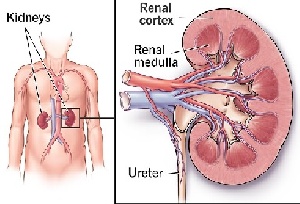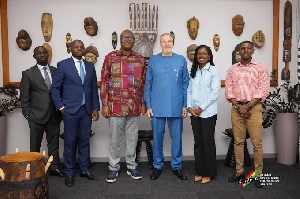- Home - Entertainment
- Lifestyle News
- Year In Review
- Music News
- Entertainers
- Entertainment Archive
- Entertainment Photos
- Jokes
- Entertainment Headlines
- Ameyaw Debrah
- Brown GH
- Celebrities Buzz
- GH Base
- Ghana Celebrities
- Gh Gossip
- GH Page
- GH Splash
- Hot Gossip GH
- YEN
LifeStyle of Saturday, 5 April 2025
Source: www.ghanawebbers.com
Are your kidneys okay?
World Kidney Day (WKD) 2025 was observed on March 13. This global campaign raises awareness about kidney health. WKD occurs every year with a new theme.
The theme for this year is: "Are Your Kidneys OK? Detect Early, Protect Kidney Health." It emphasizes the importance of early detection and intervention for kidney disease.
The Ghana Kidney Association celebrated the day with various activities. They held a webinar on March 13, chaired by Prof. Sampson Antwi.
The webinar featured experts like Prof. Vincent Boima and Dr. Beatrice Nyann. Other specialists included Perditer Okyere, Elliot Koranteng Tannor, and Edward Kwakyi.
World Kidney Day aims to achieve several objectives:
- Raise awareness about kidneys and their importance.
- Highlight diabetes and high blood pressure as key risk factors for Chronic Kidney Disease (CKD).
- Encourage systematic screening for CKD in patients with diabetes and hypertension.
- Promote preventive behaviors among the public.
- Educate medical professionals on detecting CKD in high-risk populations.
- Stress the role of health authorities in controlling CKD.
- Advocate for organ donation and transplantation as life-saving options.
To meet these goals, the Ghana Kidney Association conducts educational programs each year during WKD events. They visit nearly every region in Ghana to educate people about kidney disease.
They also offer free screening programs for kidney disease and its risk factors. These advocacy efforts are crucial as chronic kidney disease rates are rising.
In low-to-middle-income countries, CKD burden is three to four times higher than in high-income countries. The affected individuals are often young adults aged 20 to 50 years.
This age group is economically productive but may struggle to afford dialysis or transplantation costs. Therefore, prevention is essential to reduce this growing health issue.
Most people are born with two kidneys, though some have only one due to rare conditions. Kidneys remove toxins from the blood and perform other vital functions.
They help control blood pressure, maintain healthy bones, balance water levels, regulate acid-base levels, and produce erythropoietin for red blood cell formation.
Kidneys also maintain key minerals like potassium, sodium, phosphorus, magnesium, and calcium at proper levels for body function. When kidneys fail, serious health problems arise.
Globally, over 700 million people suffer from kidney diseases annually; they cause around 1.2 million deaths each year. Low-and-middle-income countries face higher prevalence rates compared to high-income nations.
In Ghana specifically, an estimated 13.3% of the population has CKD—about four million people affected. The media frequently reports on individuals seeking help for kidney diseases during their prime years.
Recent discussions about dialysis highlight that CKD is a significant public health issue in Ghana. Hypertension and uncontrolled diabetes are leading causes of kidney failure worldwide.
Other risk factors include obesity, cardiovascular diseases, smoking habits, family history of kidney issues, certain medications or herbal remedies abuse, dehydration, insufficient blood flow to kidneys, HIV infections or Hepatitis B/C infections.
Environmental toxins from heavy metals or pesticides can also contribute to kidney disease development. Lifestyle changes associated with urbanization have worsened this situation due to poor diet choices and reduced physical activity.
Early stages of kidney failure often show no noticeable symptoms—a concern in Ghana where regular checkups are uncommon. Consequently, many discover their kidney problems only when they reach advanced stages.
Symptoms of advanced kidney failure include decreased urine production and swollen legs due to fluid retention. Other signs include shortness of breath; excessive fatigue; chest pain; insomnia; decreased appetite; nausea; vomiting; itchy skin; muscle cramps; confusion; seizures; or even coma.
At this point in their illness journey patients require renal replacement therapy for survival.











